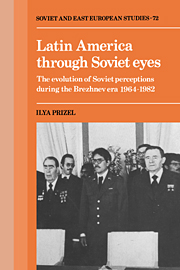 Latin America through Soviet Eyes
Latin America through Soviet Eyes Book contents
- Frontmatter
- Contents
- Preface
- Acknowledgments
- Introduction
- Part I Soviet perceptions of Latin America's global role
- Part II Soviet perceptions of Latin American social structures
- Part III Soviet–Latin American relations during the Brezhnev era
- Part IV Conclusion: the emerging Soviet perception of Latin America and the future of Soviet policy toward the hemisphere
- Conclusions
- Epilogue – Latin America: the Long March
- Notes
- Bibliography
- Index
- Frontmatter
- Contents
- Preface
- Acknowledgments
- Introduction
- Part I Soviet perceptions of Latin America's global role
- Part II Soviet perceptions of Latin American social structures
- Part III Soviet–Latin American relations during the Brezhnev era
- Part IV Conclusion: the emerging Soviet perception of Latin America and the future of Soviet policy toward the hemisphere
- Conclusions
- Epilogue – Latin America: the Long March
- Notes
- Bibliography
- Index
Summary
There are several pertinent conclusions to be drawn from the evolution of Soviet perceptions of Latin America during the Brezhnev era. Perhaps the most striking aspect of this evolution was the dramatic improvement in the quality and sophistication of Soviet analysis of the continent. Between 1917 and 1969 (the year Latinskaia Amerika was launched) most Soviet analysis resembled the caricature by the Colombian primitivist master, Botero, that depicted Latin America as a hemisphere made up of poor campesinos dominated by the obese church and military and comprador elites, which in turn acted as marionettes for US interests. This rather simplistic Soviet perception was further trivialized by the almost universal tendency to view all of Latin America as an essentially undifferentiated block of countries, from the Rio Grande to Patagonia. Only occasional attention was paid to the fact that, despite some cultural and linguistic commonalities, Latin America comprised a set of distinct countries with very different social, political, and economic structures.
By the mid-1970s, and particularly after the victory of the FSLN in Nicaragua, Soviet analysis of Latin America ceased to treat the hemisphere as a unitary body. Instead, the scholarly community in the USSR began to divide the hemisphere into various subgroupings, such as the Southern Cone, the Andean countries, Central America, and the Caribbean and Mexico. This new, non-monolithic view of the area led to far more sophisticated expectations and policies vis-à-vis Latin America.
- Type
- Chapter
- Information
- Latin America through Soviet EyesThe Evolution of Soviet Perceptions during the Brezhnev Era 1964–1982, pp. 181 - 187Publisher: Cambridge University PressPrint publication year: 1990


